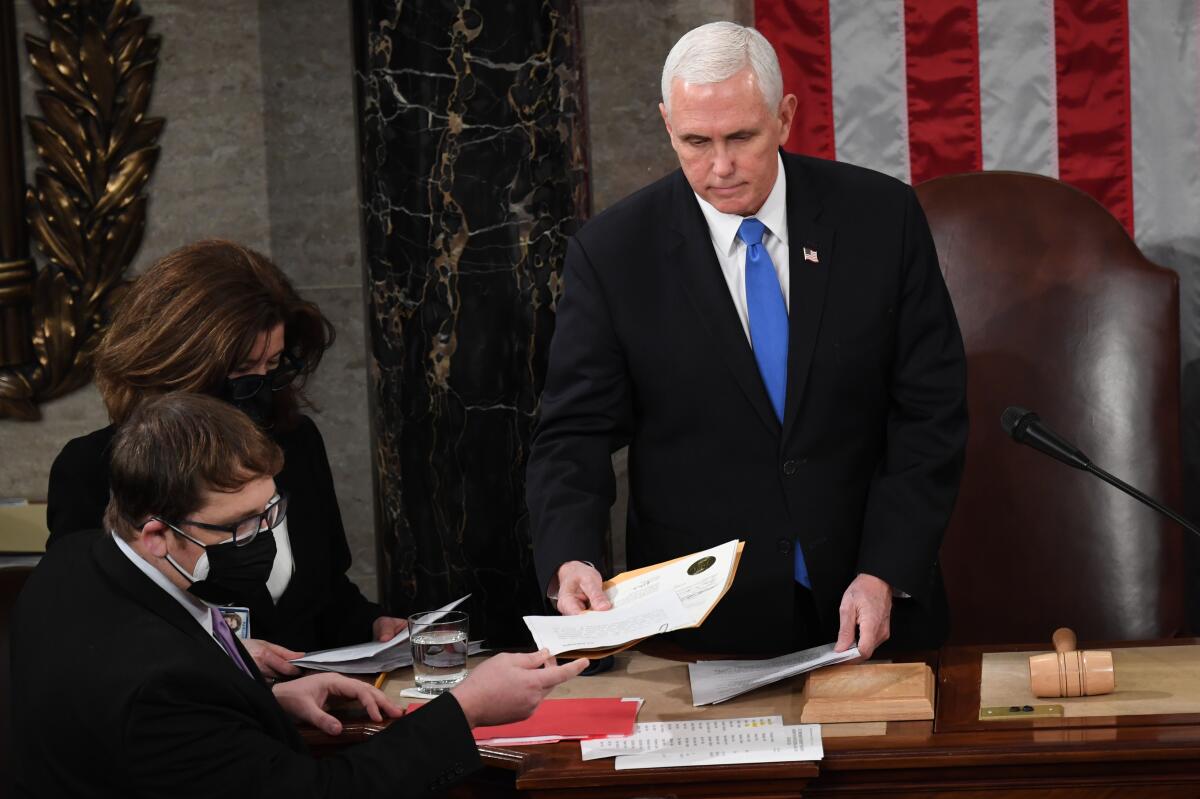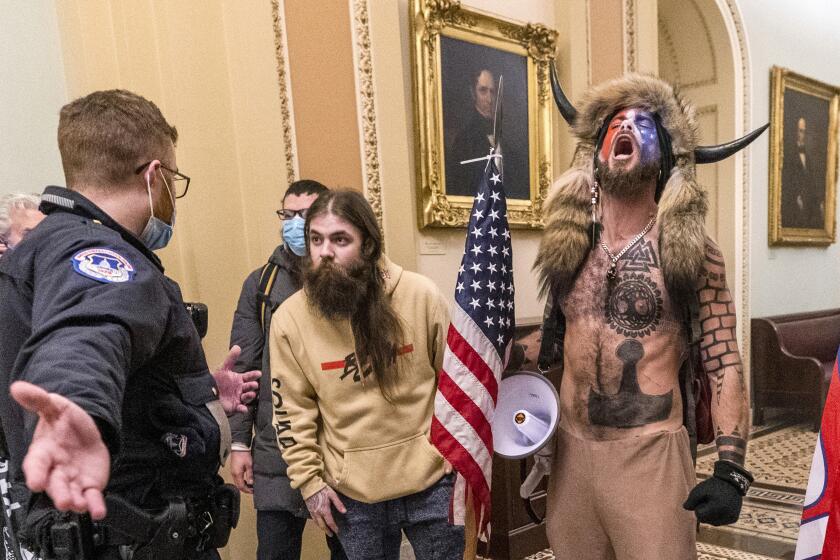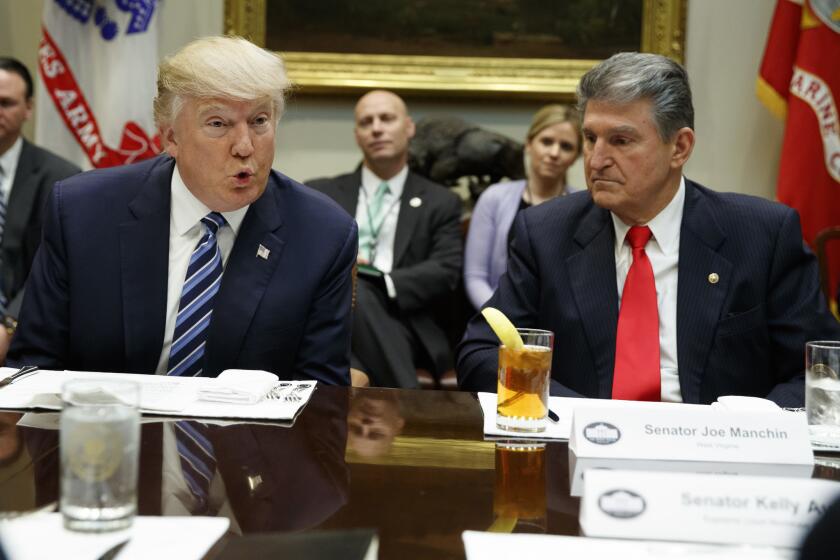Editorial: One way to prevent another Jan. 6? Update how electoral votes are counted

Patriotism and common decency demand that Americans do everything possible to prevent another attempt to overturn the results of a free and fair election, as former President Trump and his allies tried a year ago this week. Here’s one action that both Democrats and Republicans agree on: Reform the arcane 19th century Electoral Count Act.
In addition to encouraging violent marauders to storm the Capitol on Jan. 6, 2021, Trump grasped for a second term by exploiting ambiguity in the Electoral Count Act of 1887, which governs how Congress certifies electoral college votes. He pressured Vice President Mike Pence to throw out legitimate votes as Pence performed his duty to count electoral college votes from the 2020 presidential election to prevent Joe Biden from taking office. The pressure came not only through Trump’s ridiculous tweets (“Do it Mike, this is a time for extreme courage!”) but also through a frightening memo by his lawyer “war gaming” how an interpretation of the Electoral Count Act could justify Pence overturning Biden’s victory.
Though Pence didn’t cave — causing rioters to chant, “Hang Mike Pence!” as lawmakers fled the House and Senate chambers for safety — the horrific episode has constitutional scholars and election law experts calling for reforms to the Electoral Count Act to ensure that politicians tasked with certifying votes cannot subvert the will of voters. Ambiguity concerning the role of the vice president and the ability of individual representatives to challenge states’ electoral votes are weaknesses that must be fixed.
In a political landscape where the left and right agree on almost nothing, updating the Electoral Count Act may be one area of common ground. In recent weeks, academics from across the political spectrum have urged Congress to tighten up this law before the next presidential election to eliminate existing confusion. Progressive scholars see it as a way to Trump-proof democracy. Conservatives argue the same fixes could prevent Democrats from turning the tables on the GOP (in the 2024 election, it will be Democratic Vice President Kamala Harris counting the electoral votes). They agree — as do we — that the law needs to make clear that the vice president does not have the power to decide which electoral votes to count.
They also agree that the law needs to be revised so that senators and representatives cannot object to the electoral votes that have already been accepted by states. Fueled by Trump’s lie that he won the election, 147 Republican members of Congress voted to object to Arizona and/or Pennsylvania’s electoral votes last Jan. 6. Come election day, California voters should remember these representatives were among them: House Minority Leader Kevin McCarthy (R-Bakersfield), Rep. Doug LaMalfa (R-Richvale), Rep. Jay Obernolte (R-Big Bear Lake), Rep. Darrell Issa (R-Bonsall), Rep. Ken Calvert (R-Corona) and Rep. Mike Garcia (R-Santa Clarita). It wasn’t enough to overturn the results — but why should that possibility even exist?
“Congress is not a national recount board or a court for litigating the outcome of presidential elections,” four constitutional law professors wrote in the Washington Post. “It is not the role of Congress to revisit a state’s popular vote tally.”
The House and Senate need to revise their electoral-vote-counting rules, most of which come from an 1887 law called the Electoral Count Act.
Lawmakers on the House committee examining the Jan. 6 attack have said they plan to recommend changes to the Electoral Count Act. The proposal will probably emerge as part of a broader set of reforms the committee suggests later this year.
Several Republican senators — including Senate Minority Leader Mitch McConnell (R-Ky.) — said this week that they’re open to changing the Electoral Count Act, Politico reported, and centrist Democratic Sens. Joe Manchin III of West Virginia and Kyrsten Sinema of Arizona are also on board.
All of which is encouraging. It would be good for democracy and a true act of public service to clarify this law and ensure that future votes are properly counted.
But bipartisan energy on this narrow issue is no substitute for passing a broader voting rights agenda. The Senate must also pass the Freedom to Vote Act, which would set national standards for some election procedures that currently vary from state to state. Among its many changes, the sweeping bill would expand the ability to vote by mail, require states to allow early voting and curb partisan gerrymandering with new redistricting procedures. It’s meant to safeguard voting rights everywhere, but would have the most impact in Republican-controlled states that have been passing restrictive voting laws in response to Biden’s victory.
Republican-controlled states are moving to make it harder to vote. Action by Congress is needed to combat this fallout from Trump’s Big Lie.
A version of the bill has passed the Democratic-controlled House but failed in the 50-50 Senate, where the filibuster rule requires support from the minority party to advance most legislation. Senate Majority Leader Charles E. Schumer (D-N.Y.) has said the Senate will vote on suspending the filibuster if the voting bill doesn’t pass by Jan. 17.
The voting rights bill will keep legislatures from suppressing votes before they are cast. Changing the Electoral Count Act could keep politicians from subverting votes after they are cast. “Here in America, the people rule through the ballot, and their will prevails,” Biden said Thursday as part of his Jan. 6 remembrance speech. It is the duty of Congress to ensure that statement remains true by embracing both approaches to safeguard democracy.
More to Read
A cure for the common opinion
Get thought-provoking perspectives with our weekly newsletter.
You may occasionally receive promotional content from the Los Angeles Times.












